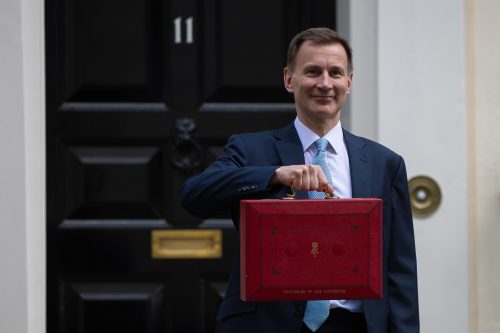National Insurance cut confirmed as Budget looks ahead to election dividing lines

National Insurance is to be cut as part of the Conservatives’ commitment “to make work pay” in a Budget that sought to lay the ground ahead of an election later this year.
Chancellor Jeremy Hunt confirmed the well-trailled 2p cut in National Insurance for employees and the self-employed, which followed the National Insurance cut in the Autumn Statement.
He said it was his “long-term ambition” to continue to cut National Insurance “to make work pay”.
“We stick to our plan with a budget for long-term growth. It delivers more investment, more jobs, better public services and low taxes,” said Hunt.
This may have been the last Budget statement before voters go to the polls, with a general election expected in the autumn and required to take place by January 2025.
A rowdy House of Commons, and a much more partisan financial statement from Hunt that included name-checking plenty of Conservative MPs, gave the chamber a febrile atmosphere throughout his 65-minute speech.
Arguably the biggest unexpected announcement was not one of the Government’s own, with Hunt revealing life sciences giant AstraZeneca is to invest £650m in the UK, in Cambridge and in a vaccine manufacturing hub in Liverpool.
To address “historic under-investment in nations and regions” the Chancellor announced a trailblazer devolution deal for the North East and a list of small, one-off levelling-up funding deals including for cultural projects in Redditch and Coventry, capital projects in Bingley, community regeneration in Runcorn and elsewhere.
The West Midlands Combined Authority will receive £50m of new funding for culture and heritage projects, but the biggest recipient of levelling-up funding is London’s Canary Wharf which is to receive £242m.
In the Chancellor’s “steps to boost investment”, he revealed full expensing would apply to leased assets and would be brought in “as soon as it is affordable”, there is £200m to extend the Recovery Loans Scheme for SMEs, and the VAT registration threshold has been increased for the first time in seven years, albeit a small nudge up from £85,000 to £90,000.
Hunt launched a £5,000 British ISA to allow for investments in UK equities, that will be on top of the existing ISA allowances. Local authorities and some pension funds will be required to disclose how much they have invested in UK shares.”
The Government will proceed with the sale of its 31% stake in NatWest this summer, subject to market conditions, that is currently valued at £7bn.
Other revenue-generating measures included the introduction of a tax on vaping products, and an increase in tobacco duty, and the extension of the windfall tax on the profits of oil and gas companies.
The “outdated” current tax system for non-doms will be abolished, and be replaced by a “fairer” system that means after four years, they will pay the same tax levels as UK residents. There will be transitional measures for current non-doms.
Hunt confirmed other widely-expected measures, including an increase in Air Passenger Duty on non-economy flights while tax relief for holiday lettings, such as AirBnb properties, will be abolished.
The higher rate of property capital gains tax is to be reduced from 28% to 24%, to encourage more transactions and therefore, it is hoped, more tax revenue.
The alcohol duty freeze has been extended to February 2025 and, in what has become an annual tradition, fuel duty has also been frozen for another year.
Hunt said he wants “a more productive state not a bigger state” and is to create a public sector productivity plan.
Investments in modernising NHS IT systems and a digital transformation plan would “unlock” £35bn of savings and slash lost hours and Hunt said he wants it to be “a model for all of our public services”.
The focus on productivity and savings comes as the Office for Budget Responsibility (OBR) forecast it expects GDP to be up 0.8% this year and 1.9% next year, a 0.5 percentage point increase from the autumn statement. However the long-term growth forecasts remain weak.









